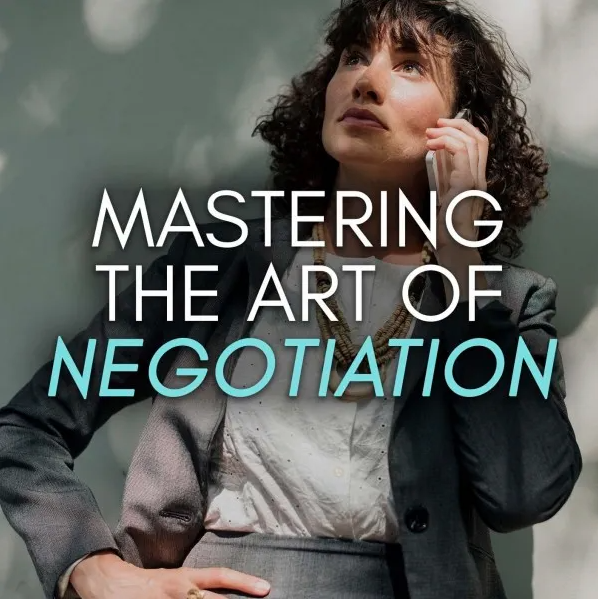
We all encounter times when negotiation is key. Whether we're trying to move up the ladder in your workplace, arguing for a better financial deal on something, or aiming to compromise with a partner, you need certain skills in order to get a good result.
In particular, you want to have the power to convince others to see your perspective, all while avoiding antagonism or direct conflict.
But what if you're not good at negotiating, or you just don't really understand what it should involve?
Thankfully, good negotiation skills can be learned. In this article, we'll cover the basics that you need to know in order to get better at negotiation.
We'll start by explaining what good negotiation skills involve, and take a look at how they can help you succeed in life.
Then, we'll discuss warning signs that your negotiation skills need work before finally offering seven strategies that can help you improve.
What Are Good Negotiation Skills?

And, essentially, when we talk about negotiation skills, we're talking about a set of abilities that add up to an ability to persuade others to make changes.
They include the following:
- Clear, assertive communication - you say what you mean.
- Listening skills - you pick up on the body language and word choice of others.
- Being able to build relationships with others - you display empathy and respect.
- Problem-solving abilities - you can analyze a situation and predict multiple different outcomes.
- Decisiveness - you trust your own intuition and your own judgment.
- Courage to face challenges head-on - you're willing to step out of your comfort zone.
When you add all of these sub-skills together, you get a picture of someone who is likable, direct, confident, and compelling.
Without argumentation skills and assertiveness, you are simply someone who gets along well with others.
However, if you are assertive and persuasive but not attentive and empathetic, you will create resistance and defensiveness in the people you talk to.
With all this in mind, let's spend some time considering why such skills are ultimately so important to doing well in life.
Why Are Negotiation Skills Important?

As a master negotiator will tell you, these skills are valuable in all aspects of everyday life.
To start to see this, try to think about five examples when negotiation has played a crucial role in your own life.
We negotiate with teachers and professors for grades or deadline extensions, we negotiate with employers for better pay, and we negotiate with partners to create a relationship that suits both parties.
Being good at negotiation helps you to be happier and more successful because these skills help you come to mutual agreements without hurting one another's feelings.
Rather than engaging in long, exhausting arguments, you quickly converge on some area of common ground. So, you're able to reach your goals while preserving - and even enhancing - relationships.
How Can I Improve My Negotiations?

Take opportunities to negotiate when the stakes are low, and notice what works to get the results you want.
This will give you the knowledge and confidence to pursue higher-level negotiations with more important consequences.
That said, it's even more useful to notice what doesn't work in negotiations, and to be alert for signs that your negotiation skills need improving.
Using bad negotiation skills ultimately causes more harm than merely failing to negotiate. Remember, however, this doesn't say anything meaningful about your value or talent!
Learning to negotiate is akin to riding a bike - we all have to practice, and few of us are immediately, consistently good at it.
Recognizing When I’m Hindering Myself With Bad Negotiation Skills
Bad negotiation looks slightly different for everyone and in every situation, but there are certain common features.
Here are three of the ways in which people often fail to negotiate successfully, along with the lessons that you can learn from them in order to ultimately become a good negotiator.
Overlooking The Problem And Being Self-Centered

It can easily become a shouting match about hurt feelings, unresolved resentments, and worries about what the other person might be implying.
Instead, ask yourself: what exactly is the key problem here? This is the specific thing that needs to be discussed right now, no problems from the past or how the current problem relates to some other aspect of the relationship you have with this person.
You can communicate this in a way that maximizes the chances of a positive response. Think something along the lines of "I feel like we're getting off track.
I want us both to get what we want, and I think the central problem here is X." This redirects conversation while showing that you care about the outcome of the negotiation for both parties.
Impatience And Expecting An Agreement Right Now
When negotiation is important to you, it's tempting to push for quick results.
However, if you pressure someone else for an immediate agreement, they may feel like they don't have space to think or like they're being bullied.
If you can wait until you have developed a good, solid relationship with someone prior to negotiation, you're much more likely to get what you want.
This is especially the case in a workplace, where you can make a name for yourself and gain a positive reputation before asking for the thing you need.
And if your negotiation can't wait, at least pay some lip service to the fact it's rushed. You can go far with sentiments like "I'm not asking for a decision right now, but please think it over."
Negotiating Is Not Just ‘Haggling Over The Price’

However, haggling is combative, and you'll get much more from negotiations that you approach in a collaborative way.
To help you get into the right mindset, don't just ask yourself what you want. ask yourself what you'd be willing to give up.
The move from haggling to genuine negotiating also requires a shift in language so that you're talking in a way that underlines collaboration.
You want the other person to feel like you are aligned toward the same goal - the goal of both parties being happy.
So, questions like "What do you want?" become "Why do you want X?". Meanwhile, questions like "Are you going to accept this, or just give up?" can be much more helpfully framed as "Let's think of all the different possible ways we can resolve this."
How To Improve Your Negotiation Skills
So, now you know a bit more about what successful negotiations look like, and how to spot problems with your own approach to negotiating.
However, if you're going to be successful in the long term, you should aim to become a master negotiator. Here are seven things you can do to get significantly closer to that goal.
Be Prepared: Make Sure You Have The Facts Right
Many conflicts and problems arise because one or both parties misunderstand some crucial fact about the situation.
Before you go into a negotiation, ask yourself: what do I need to know? Check and double-check the relevant facts, and make sure they're to hand during the discussion.
To prepare even further, try to anticipate places in which the other person may have misunderstood the situation. This means you have a clear, respectful reexplanation ready to go.
Define Your Goals: Know Exactly What You're Asking For
While you'll likely only enter into a negotiation if you have some goal in mind, try to sharpen that goal as much as possible.
For example, don't approach your boss simply with a request for more responsibility - have a few examples in mind about what that responsibility might look like.
In addition, think about the underlying reasons for negotiation, and about other solutions, you might be prepared to accept if you don't get your first choice.
Have A Negotiation Strategy: Know Exactly What You Will Do In Every Circumstance
As hinted at in the above two suggestions, negation strategies are absolutely key to success.
So, give some serious thought to anticipating how the other party might respond to your suggestions. If you can imagine their moves and your counter-moves, you'll be much more likely to get what you want.
Be sure to think about unpleasant scenarios too, like what you will do if the other person becomes combative or tries to take the conversation off track.
Know Your Worth: Don’t Sell Yourself Short
While it's good to know what you're willing to give up in a negation, make sure that's proportionate to your worth. It's easy to mistake low self-esteem for flexibility!
In other words, don't undervalue yourself in a negotiation. Know what you bring to the workplace or the relationship, and use these strengths to argue for what you want.
However, be realistic about this. So, be aware of your weaknesses, too, and what you don't yet bring to the table.
Time Is Always On Your Side: An Agreement Does Not Need To Be Agreed Immediately
If you can motivate others to give serious thought to your position, you've already succeeded in a significant way in any negotiation.
That said, people often need a bit of time and space to come around to a different viewpoint, and it's wise to give that to them.
If they seem overwhelmed with information or appear to become defensive, back off a little. Suggest a time in the future when you can reconvene to talk in more depth.
Listen Carefully: You Will Engage The Other Person More Effectively
You have plenty of things you want to say in a negotiation, but don't just look for places to insert them. Instead, really tune in to what the other person is saying.
Do they seem intimidated? Anxious? Annoyed? Eager to please? Listening closely allows you to look for clues to what kind of compromises they might accept.
Plus, it communicates respect and genuine interest, which already puts you in a stronger position in the negotiation.
Always Aim For The Win-Win
Finally, while it's great to set your sights high, the best outcome of most negotiations is something that pleases both people.
So, enter the conversation with the assumption that you will both exit with a win, and indicate that you're keen to collaborate to find out what that win might be.
Once again, this helps to lower the other person's defenses and keep the conversation focused on the common good.
Learn More About Mastering The Art Of Negotiation Hypnosis

However, if you want to become a master negotiator, there's no better tool at your disposal than negotiation hypnosis.
You can do your self-hypnosis in your own time and in the privacy of your own home, and you can begin to see results after just one session.
By tapping into your subconscious mind and helping you to change how you think and feel about negotiating.
You can boost your confidence in dealing with others, and begin to feel more relaxed about negotiation.


